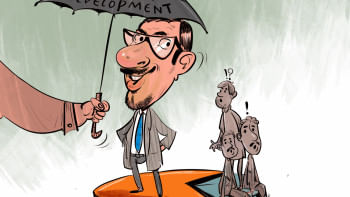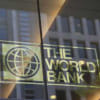Banking sector holding the economy hostage

For years now, the banking sector in Bangladesh has been in a state of perpetual crisis, riddled with non-performing loans (NPLs), scams, capital flights, and poor regulation. At a time when financial institutions should have been strengthened to facilitate the country's aspirations to graduate to upper-middle-income status, we witnessed corruption and poor governance eroding their very foundation, exposing the economy to untold risks. Despite repeated warnings to the government to bring about major reforms to the banking sector, the crisis has only gotten worse with time, with no visible effort to rein in the chaos and mismanagement that debilitate the system.
A recent report by the World Bank has identified that Bangladesh needs a more resilient financial sector to finance and sustain its growth in the future. Bangladesh's ratio of private credit to GDP is one of the lowest among its structural and aspirational peers, the study found, as a result of long-standing vulnerabilities in the banking sector that threaten financial stability, structural inefficiencies, weak regulatory and supervisory environment, and shallow capital markets. According to the IMF's global Financial Development Index, while peer countries such as China, Vietnam, Cambodia, and Thailand have bank-credit-to-GDP ratios that are substantially above 100 percent, in Bangladesh, this ratio has become stagnant at around 45 percent since 2016. Unless our government takes urgent steps to rectify these issues, it will simply not be possible to facilitate productive investments that are needed for the country to progress to the next level.
The WB report points out that Bangladeshi banks have the highest levels of official default loans among the country's peers, coupled with very low profitability, with at least 20 percent of the total loans in the banking system being granted to directors. Even though there are restrictions on directors obtaining loans from their own banks without the central bank's prior approval, they can easily obtain loans from other banks, either directly or through family members.
The fact that ownership and management of the banks are in the hands of influential people with political ties means they remain out of reach of regulatory bodies who are either too weak or too complicit to reign them in. Meanwhile, Bangladesh Bank continues to allow big borrowers to default on loans as and when they please, at times under external pressure from the finance ministry and in violation of all banking rules and regulations. As a result, what we have now is a conducive environment for defaulters to keep on defaulting with impunity, while discouraging private sector investments.
The government has long known of the dangers of refusing to institute much-needed reforms in the banking sector; yet, it has essentially held the economy hostage to protect the self-serving interests of money launderers, frauds and loan defaulters. It must now seriously weigh whether it is worth jeopardising the future of the nation, its legacy of robust economic development and indeed all that Bangladesh has been able to achieve over the decades, despite the myriad challenges it has faced since independence, to line the pockets of some politically connected people and businesses. It must undertake comprehensive reforms, including increasing efficiency of the banking sector, ensuring regulatory practices and laws that are in line with best international practices, and increasing Bangladesh Bank's independence so that it can deal with crises in a timely and cost-effective manner.


 For all latest news, follow The Daily Star's Google News channel.
For all latest news, follow The Daily Star's Google News channel. 








Comments